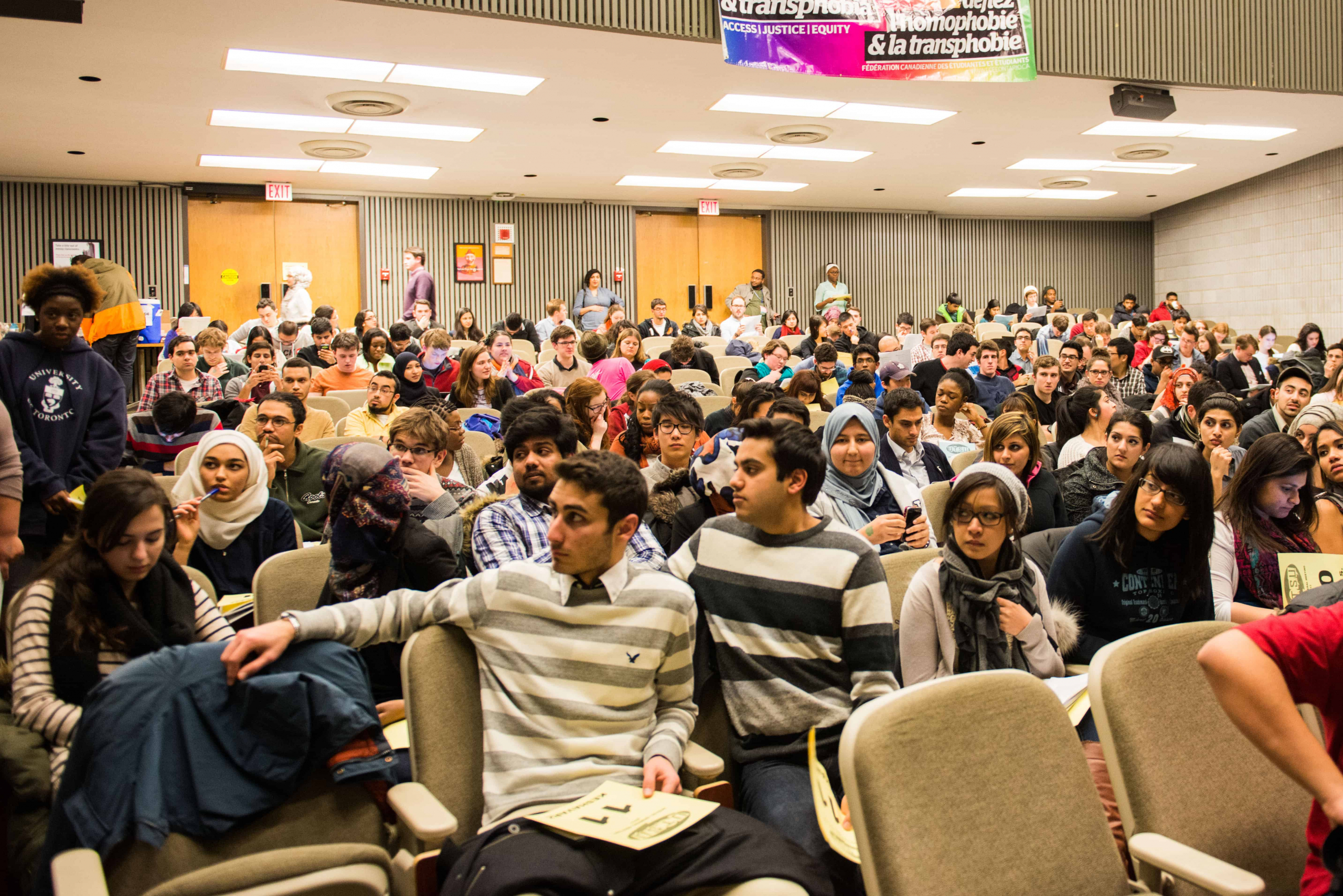Though politicians are never all things to all people, the political process almost always is. In other words, everyone could take something positive, however meager, from last Tuesday’s Special General Meeting (SGM) of the University of Toronto Students’ Union (UTSU). For those yearning for action, the meeting was, in many ways, a productive step forward. It considered 15 motions, each diverse in significance, subject, and scope — exactly 15 more than November’s ill-fated Annual General Meeting succeeded in addressing.
For those lamenting the increasing acrimony of campus politics, the meeting was refreshingly civil, and chair Ashkon Hashemi is to be commended for presiding fairly and maintaining order. That’s not to say there was no discontent, but rather that it was expressed more through seething than shouting. For the UTSU executive committee and their supporters among the membership, the meeting could only have brought a sigh of relief, as they were able to once again neutralize the threat of even talking substantively about electoral reform. At the same time, for those who support such reform, the meeting must have been largely anticlimactic and deeply frustrating.
For me, the SGM clearly showed some of the peculiarities of campus politics. First, what seems to be procedural is also partisan and political. A call to move a motion forward on the agenda is not simply that if the motion concerns electoral reform, and a motion to limit debate to two minutes per speaker is not simply that, if its proponent seems like a partisan of the UTSU leadership. Second, the student unions are both the supposed representatives of general student opinion — if consensus is ever achieved — and advocates for particular political agendas. It goes without saying that there is a disparity between what all students could agree upon and what a majority of voting members presently agree upon, and this affects the discussion. In fact, on the most divisive contemporary issues — misogyny, Aboriginal treaty rights, Canadian military spending, environmentalism — the SGM saw more debate about how much to say rather than what to say. Civil debate of this nature is student politics at its best: members expressing and discussing what they want their own union to do, to be, and to represent.
However, even an agenda containing motions on such contentious issues as condemning AVoiceForMen.com and endorsing the Idle No More campaign, electoral reform still managed to appear as the prize-fight. This is partly due to the effective and commendable efforts of Ben Dionne, Sam Greene, Paulina Bogdanova, Rishi Maharaj, and other ‘reformists’ to publicize and promote the issue. However, the UTSU executive must realize that their intractability on the issue is another major reason why electoral reform threatens to become the issue that may swallow an entire year — or more — of union business. It has already scuttled one general meeting, and ended this one prematurely.
The UTSU leadership has sidestepped both debate and an up-or-down vote on the question of electoral reform and online voting, whether by procedural calculation or serendipity. It is unclear which was at play last Tuesday when a last-minute loss of quorum halted the proceedings, but the outcome will only stoke resentment and suspicion. More positively, it will also heighten anticipation for the SGM’s continuation this week, and proponents of electoral reform would be wise to harness this excitement to ensure an ample turnout.
Personally, I am a strong supporter of online voting. I’m inclined to question the sincerity of the UTSU leadership’s ostensible concerns over the potential for hacking and fraud, though I share their doubts that online voting can be effectively implemented within as tight a time frame as is demanded by the ‘reform’ movement. I don’t necessarily see their stubbornness on online voting as a conspiracy to maintain their dynasty of perfect incumbency, though I am eager to see open, extended debate and an eventual vote on the issue, even if it results in a fair defeat. So, if last Tuesday’s SGM was an infuriating letdown for the proponents of electoral reform, the positive they can take from it is the assurance that, at this week’s meeting, their motion will finally be at the top of the agenda.
Wes Dutcher-Walls is a fourth-year student of political theory.


